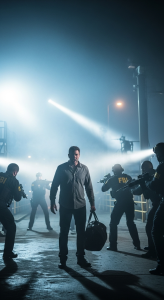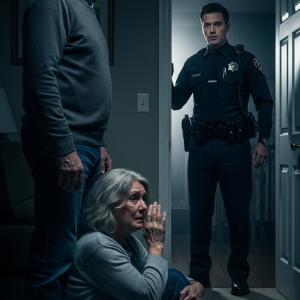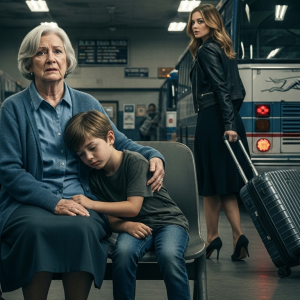The eulogies painted a portrait of a saint in a policeman’s uniform. Detective Mark Ryland: devoted husband, loyal partner, courageous officer. A hero, they called him, who had made the ultimate sacrifice in a fiery shootout with arms dealers down by the shipyards. Clara sat in the front pew of the cavernous, sun-drenched church, a black veil obscuring a face numb with a grief so profound it had transcended tears.
She felt like a ghost at her own husband’s funeral. The folded flag presented to her by the police commissioner felt impossibly heavy, a tangible weight of a future that had been stolen. The sea of blue uniforms, the somber salutes, the platitudes about valor and duty—it all blurred into a surreal, waking nightmare.
Mark’s partner, Detective Evans, was a constant, almost suffocating presence. His eyes were red-rimmed, his face etched with a sorrow that seemed to mirror her own. He had been with Mark in the end. He had held his hand, he’d said.
“Anything, Clara. I mean it. Anything at all,” he’d repeated for the tenth time at the wake, his grip on her arm tight. “Mark… he was the best of us. He saved my life more times than I can count. I owe him everything.” His devotion was touching, yet a tiny, discordant part of Clara’s grieving mind noted how he couldn’t quite meet her eyes when he said it. His gaze was always just past her shoulder, as if looking at a ghost only he could see.
The weeks that followed were a hollow, administrative affair of death certificates and insurance claims. Clara moved through her days on autopilot, the silence in their home a constant, screaming reminder of Mark’s absence. At night, memories would ambush her in the dark. She remembered their last anniversary, a quiet dinner at home. He had seemed distracted, distant.
(Flashback)
“Is everything okay, honey?” she’d asked, reaching for his hand across the table.
He’d pulled his hand back, forcing a smile. “Just… a tough case. The usual pressures.” He was always vague about money, waving off her questions with a paternalistic, “Don’t you worry about that. I’ve got it handled.” She trusted him completely, but now, in the silence, she recalled the frequent, large cash withdrawals from their joint account. “Risky investments,” he’d called them. “High risk, high reward.”
(End Flashback)
Another memory surfaced, unbidden, from a few months back. They were watching a movie, a thriller about a man who fakes his own death. Mark had laughed, a strange, hollow sound.
“You know, sometimes I wish I could just do that,” he’d joked, gesturing to the screen. “Just… disappear. Erase the slate. Start over on a beach somewhere with no bills and no bullets.”
“Don’t even say that,” she’d chided him gently, curling up against him. He had held her, but his embrace felt less like affection and more like an apology. She had dismissed it as the gallows humor of a cop worn down by the job. Now, the memory felt like a shard of glass in her heart, a ghastly premonition she had been too blind to see. The hero she was mourning was already beginning to feel like a stranger.
Three weeks after the funeral, Detective Evans called. “Clara, I know this is hard, but we need to clear out Mark’s locker at the precinct. Department policy. I can be there with you, if you want. We can do it together.”

The precinct smelled the same as it always had: stale coffee, paperwork, and the faint, metallic scent of duty. As she walked down the hallway with Evans, the respectful nods and averted eyes of the other officers felt like a fresh wave of condolences. This place had been Mark’s second home, and she felt his absence in every corner.
Evans unlocked the tall, grey metal locker. The interior was a time capsule of her husband’s life. A spare uniform, neatly hung. A worn-out baseball cap from his favorite team. A framed photo of the two of them, smiling on a beach. The scent of his aftershave, faint but unmistakable, wafted out, and for a moment, it felt like he was standing right beside her.
She began to pack the items into a cardboard box, each object a fresh stab of pain. His favorite coffee mug. A dog-eared paperback. A handful of medals for commendation. It was all so… Mark.
“Take your time, Clara,” Evans said softly, his voice thick with emotion. He was hovering by the door, his presence both a comfort and a strange source of unease.
As she reached for a pair of old running shoes at the bottom of the locker, her fingers brushed against something hard and metallic taped to the underside of the built-in shelf. It was a false bottom, a thin sheet of metal painted to match the locker. Her heart gave a sudden, hard thud. Mark was a man of secrets—it was the nature of his job—but this felt different. This was a secret he kept from everyone.
With trembling fingers, she pried the panel loose. Behind it, nestled in the dark recess, was a small, locked metal box, no bigger than a book. It felt cold and heavy in her hands.
“What’s that?” Evans asked, stepping closer, his voice suddenly sharp with an emotion she couldn’t identify. Alarm?
Clara’s mind raced. An instinct she didn’t know she possessed—a sudden, cold wave of self-preservation—took over. “Oh, it’s nothing,” she said, forcing a casual tone and tucking the box into her purse. “Just an old box of his. Full of sentimental junk, I’m sure.” She didn’t know why she lied. But the look in Evans’ eyes told her she had made the right decision.
Back in the suffocating silence of her home, she sat at the kitchen table, the metal box in front of her. She found a small key in the false bottom of her own jewelry box—a place Mark had once told her was for a “rainy day.” It fit. With a soft click, the lock opened.
The contents were not sentimental junk. They were the methodical, damning pieces of a secret life. There was a single, unfamiliar key with a post office box number engraved on it. There was an official, state-issued birth certificate for a child named Leo Ryland, born eighteen months ago. The father’s name was Mark Ryland. The mother’s name was Amy Tilden.
And at the bottom of the box, there was a cheap, disposable burner phone.
Her world began to tilt on its axis. Denial was a physical wall in her mind, screaming that there had to be an explanation. An old case. An informant’s identity. Anything but the truth that was staring her in the face. With a hand that shook so violently she could barely control it, she pressed the power button.
The phone lit up, and a flood of notifications appeared on the screen. Dozens of text messages. Many were from a contact simply labeled ‘A’.
A: Leo said ‘Dada’ today. I wish you were here to see it. A: Are you okay? Haven’t heard from you. Getting worried. A: I know the job is dangerous, Mark. Just… be safe. We love you.
Clara felt the air leave her lungs, a silent, strangled scream. But mixed in with the mundane, heartbreaking messages of a second family were others, from a blocked number. These were different. Coded. Cryptic.
Unknown: The shipment is docked. Confirmation pending. Unknown: The buyer is nervous. Your situation complicates things. Unknown: We need the final signal. Payment on delivery. Stick to the plan.
The grief she had been drowning in for weeks was suddenly replaced by a terrifying, icy clarity. She wasn’t a hero’s widow. She was a fool. And the man she had loved didn’t just have secrets. He was a secret.
The post office box was in a suburb on the other side of the city, a place Mark had never had any reason to go. The key slid into the lock with a sickening ease. Inside was a single envelope containing a utility bill for an address not far from there. It was addressed to Amy Tilden.
Clara spent two days in a state of suspended animation, the burner phone and the bill sitting on her counter like unexploded bombs. To act on this knowledge was to accept it, to detonate the last vestiges of the life she had believed in. But not knowing, letting the lie fester, was worse. She was no longer just a grieving widow. She was an investigator, and this was her only case.
She drove to the address, a quaint, well-kept bungalow on a street lined with oak trees. It was the kind of house she and Mark had once talked about buying. The irony was a bitter pill. She parked across the street, her heart hammering against her ribs. What was she even doing here? Was she going to confront this woman? Scream at her?
She was about to drive away when the front door of the house opened. A woman with kind eyes and tired, honey-blonde hair stepped out, balancing a toddler on her hip. The little boy had a shock of dark, curly hair and a serious expression. He turned his head, and Clara’s breath hitched. He had Mark’s eyes. The exact same deep, soulful brown eyes that had made her fall in love a decade ago.
It was real. All of it.
Clara got out of the car, her legs unsteady. She didn’t have a plan. She just walked across the street, propelled by a force she didn’t understand. As she approached, the woman—Amy—looked up, a flicker of recognition, then confusion, on her face. She had seen Clara’s picture in the news articles about the heroic fallen detective.
“Can I help you?” Amy asked, her voice cautious as she instinctively pulled her son closer.
Clara’s own voice was a dry, cracking whisper. “My name is Clara Ryland. I’m… I was Mark’s wife.”
Amy’s face crumpled. The strength seemed to drain out of her, her body sagging against the doorframe. “Oh, God,” she whispered, her eyes filling with a mixture of pity and dawning horror. “You’re… Clara. The one from the papers. I am so, so sorry for your loss.”
The words were so sincere, so full of genuine compassion, that they shattered Clara’s last defense. This woman wasn’t a villain. She wasn’t a homewrecker. She was another victim, caught in the same web of lies.
“He told me…” Amy’s voice faltered, her gaze dropping to the floor. “He told me you two divorced years ago. He said it was amicable, that you just… grew apart. He said you were happy.”
Clara felt a bitter, hysterical laugh bubble up in her throat. “Happy.” She stepped inside as Amy, seemingly in a trance, moved aside to let her pass. The house was filled with the evidence of a life. A child’s drawings on the fridge. A man’s pair of sneakers by the door. On the mantelpiece was a photo of Mark, Amy, and little Leo, all smiling, a perfect, happy family. A perfect, happy lie.
They sat in the living room, two strangers connected by the ghost of a man who had been a husband to both of them. They pieced together the timeline, their voices low and trembling. His “undercover assignments” for Clara were his family weekends with Amy. His “training seminars” were vacations. He had orchestrated his life with the precision of a master strategist, building two separate worlds, two separate families, two separate realities.
They were two widows, mourning two entirely different men. Clara mourned the hero cop, the devoted husband. Amy mourned the loving partner, the doting father who was finally free from a difficult past. They now knew both men were phantoms, elaborate fictions created by a master deceiver.
As they sat in the wreckage of their shared past, a new, jarring reality intruded. The burner phone, which Clara had placed on the coffee table between them, buzzed. A new text message glowed on the screen. It was from the unknown number.
“Final confirmation. Shipment is clear. Pier 7. Midnight tomorrow. Come alone. They all think you’re dead. Let’s keep it that way.”
The room went cold. The air, already thick with grief and betrayal, was now electrified with a new, terrifying truth. Clara and Amy stared at each other, the same thought dawning in their eyes.
“He’s alive,” Amy breathed, her hand flying to her mouth, her face a mask of disbelief and horror.
The grief that had defined Clara for weeks instantly curdled, crystallizing into something hard, cold, and razor-sharp: rage. He wasn’t dead. He hadn’t been taken from her. He had left. He had chosen to abandon her, to abandon them. His “heroic death” wasn’t a tragedy; it was an exit strategy. A way to cash in on his own life insurance policy and disappear from two lives he had grown tired of, all while funding his escape with dirty money.
“He betrayed everyone,” Clara said, her voice devoid of any emotion but a chilling, newfound purpose. “He betrayed me, you, our children… and the badge he wore.”
In that moment, an unspoken alliance was forged. They were no longer rivals or victims. They were the only two people on earth who knew the full extent of Mark Ryland’s deception. And they were the only ones who could bring him down.
“We can’t go to the police,” Amy said, her mind catching up, the fear giving way to a strategic coldness of her own. “Evans… his partner. If Mark is this deep into something criminal, who knows who else is involved? We can’t trust any of them.”
She was right. They were completely on their own. For a moment, the sheer scale of it was paralyzing. They were two civilian women against a corrupt cop and his criminal network. But the rage was a powerful fuel.
Clara picked up the burner phone, her fingers steady. She looked at Amy, a silent question in her eyes. Amy gave a firm, resolute nod. They were in this together. Clara typed a one-word reply to the message.
“Confirmed.”
Then, she opened a fresh browser on her own phone. She didn’t search for the city police department. She searched for the regional field office of the FBI. She found the number for the Public Corruption and Civil Rights hotline. They would make one anonymous phone call, providing a time, a place, and a warning about a dirty cop who was supposed to be dead. They would set the stage, and let the real good guys handle the final act.
The air at Pier 7 was thick with salt and the smell of diesel fuel. A heavy fog rolled in off the water, muffling the sounds of the city and shrouding the hulking container ships in a ghostly mist. It was a perfect night for secrets and betrayals.
Hidden in an unmarked vehicle two hundred yards away, Clara and Amy sat with two grim-faced FBI agents. They were witnesses, not participants, but Clara’s heart was pounding as if she were the one walking into the trap. The agents had been skeptical at first, but the specificity of the anonymous tip—the name of a decorated dead cop, the nature of the criminal enterprise—had been too compelling to ignore.
Just before midnight, a dark sedan pulled up to the end of the pier. A man got out. He was thinner, his hair was different, but it was him. Mark Ryland. Alive. Breathing. A ghost walking out of the fog. Seeing him, whole and unharmed, was a physical blow. The final, brutal confirmation of his betrayal.
He walked towards a shadowy figure waiting by a stack of shipping containers. They spoke for a moment, and a heavy duffel bag was exchanged. It was the “final payment.”
And then, the night exploded.
Floodlights from a dozen hidden positions erupted, bathing the pier in a harsh, unforgiving glare. The command, “FBI! Don’t move!” boomed through a loudspeaker, echoing across the water. Agents swarmed the area from all sides, a perfectly executed takedown. Mark froze, the duffel bag dropping from his hand, his face a mask of pure, unadulterated shock. The hero cop, the master manipulator, was caught.
The destruction of his legacy was swift and absolute. The story was a media firestorm. DETECTIVE MARK RYLAND, HERO COP, ALIVE AND ARRESTED IN FBI STING. His face was plastered across every news channel, no longer the smiling, handsome hero, but the haggard, defeated face of a common criminal.
The police department, shamed and scrambling, held a press conference. The commissioner announced a full internal investigation. Detective Evans, it was later discovered, had known about the financial irregularities but had kept quiet out of a misguided loyalty. His career was over. Mark’s name was ceremoniously stripped from the department’s wall of honor, the plaque removed like an ugly stain.
He lost everything. He lost his freedom, facing a long list of federal charges. He lost the money. And he lost both families, two monuments to his deceit. He had tried to be the hero of two stories, and had ended up the villain in both.
Days later, Clara and Amy met one last time, at a neutral coffee shop halfway between their two homes. There were no tears left to cry.
“The life insurance and benefit claims have been frozen, pending the investigation,” Clara said, her voice flat. “It was all blood money anyway.”
“What will you tell Leo?” Amy asked softly.
Clara was silent for a long time. “One day, I’ll tell him the truth. I’ll tell him his father was a complicated man who made terrible choices.” She looked at Amy, the woman who should have been her enemy, but was now the only other person in the world who understood the depth of her scars. “We’ll be okay. We have to be.”
They weren’t friends. They could never be. They were two strangers, forever bound by the ghost of a man they had both loved, a man who had almost destroyed them. But he had failed. They had survived. And in the quiet, shared understanding between them, there was not a happy ending, but something far more valuable: there was justice.




